In today's data-driven world, hiring a skilled Data Coordinator is fundamental to efficiently managing, organizing, and ensuring the integrity of your organization’s data. Often, companies overlook the nuances of this role, mistakenly equating a Data Coordinator with a Data Analyst. However, a Data Coordinator's responsibilities are distinct, focusing more on maintaining databases and ensuring data accuracy across departments. The key challenge many organizations face is identifying candidates who not only understand data management principles but also possess the attention to detail and organizational skills necessary for the role.
In this post, we will guide you through the process of hiring a Data Coordinator, covering the essential skills and qualifications to look for, the steps in the hiring process, and platforms where you can find top candidates. For more insights on crafting a compelling job description, check out our detailed guide on Data Coordinator Job Description.
Table of contents
Why Hire a Data Coordinator?
Consider hiring a Data Coordinator when your organization faces challenges in managing and organizing large volumes of data. For example, if your marketing team struggles to consolidate customer information from various sources, a Data Coordinator can streamline this process and improve data quality.
A Data Coordinator can also help with:
- Implementing data governance policies
- Ensuring data consistency across departments
- Preparing data for analysis and reporting
If these tasks are currently spread across multiple roles or taking up significant time from other team members, it may be time to bring in a dedicated Data Coordinator. For smaller projects or short-term needs, consider working with a consultant before committing to a full-time hire.
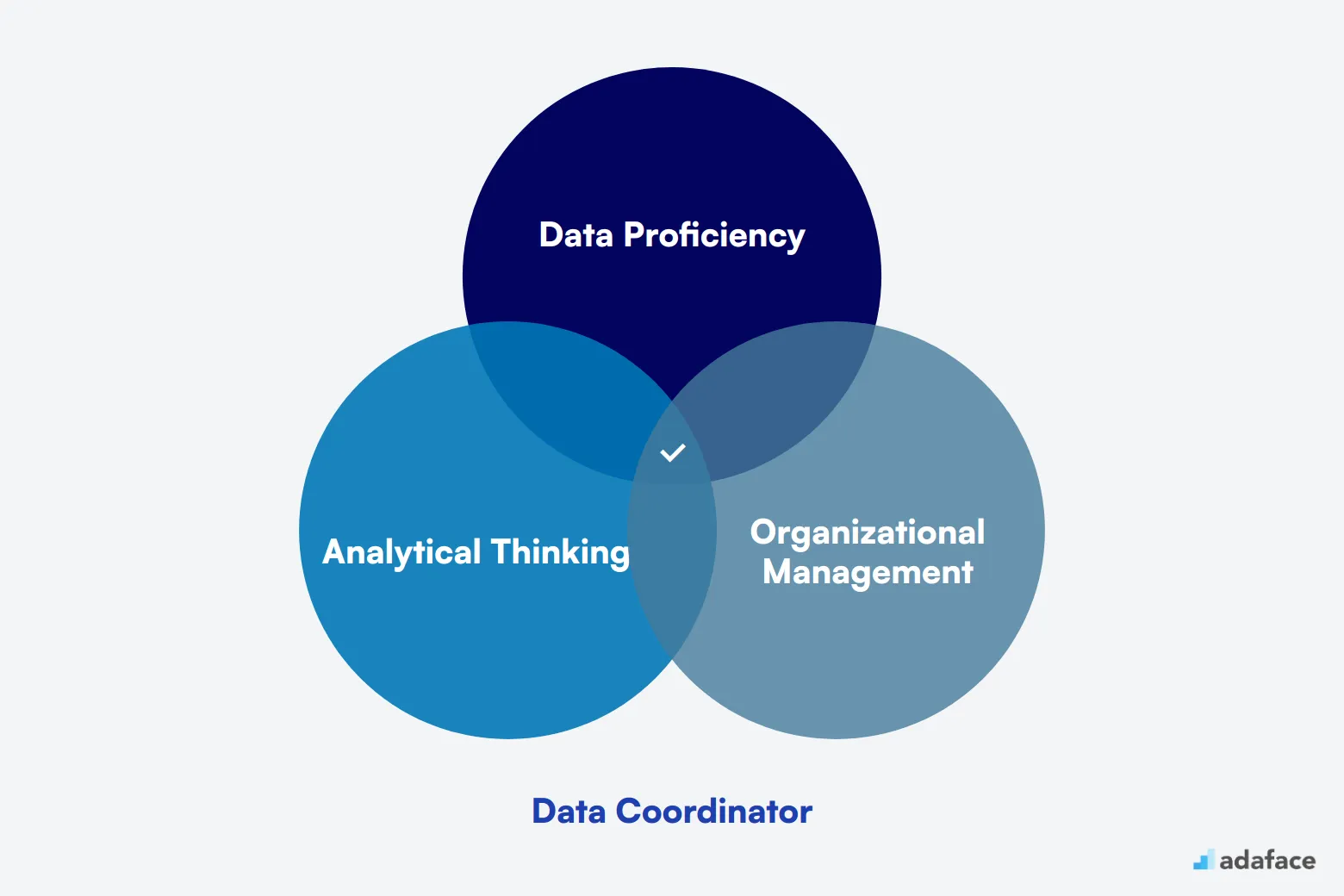
What does a Data Coordinator do?
A Data Coordinator plays a key role in managing and organizing data within an organization. They are responsible for collecting, processing, and maintaining data from various sources to ensure its accuracy, accessibility, and usefulness for decision-making processes.
The day-to-day tasks of a Data Coordinator typically include:
- Gathering and entering data from multiple sources
- Cleaning and validating data to maintain quality
- Creating and updating databases
- Generating reports and visualizations
- Collaborating with team members to ensure data consistency
- Implementing data management best practices
- Assisting in data analysis projects
Data Coordinators often work with tools like Excel, SQL, and various database management systems to perform their duties effectively.
Data Coordinator Hiring Process
Hiring a Data Coordinator can take around 6 to 8 weeks. This timeline ensures a thorough process to find the right candidate who can manage and analyze data efficiently.
- Create a detailed job description: Start with a clear and concise job description tailored for a Data Coordinator, detailing the required skills and responsibilities. Post it on relevant job boards and your company’s career page.
- Resume collection: Expect to receive resumes within the first 3-5 days after posting. Begin shortlisting candidates based on qualifications and experience.
- Skill assessment: Conduct skill assessments to evaluate candidates' capabilities in data management and analysis. This step typically takes about a week.
- Interviews: Schedule interviews for shortlisted candidates to assess their fit for the role. Aim for a mix of technical and behavioral questions for a well-rounded evaluation.
- Offer stage: Select the best candidate and extend a job offer. Be prepared for negotiation and finalize the onboarding process.
Overall, the process generally spans 1 to 2 months, depending on how quickly you move through the steps. In the following sections, we will explore each stage in detail, providing useful checklists and resources to assist you.
Building the Ideal Candidate Profile for a Data Coordinator
Before hiring a Data Coordinator, it's important to craft a clear candidate profile. One common mistake recruiters make is confusing required skills with preferred ones. Ensure you distinguish between what's necessary for the role and what's a bonus.
When crafting your list, focus on required skills like a Bachelor's degree in Business Administration or Statistics, proficiency in data management software, and strong analytical abilities. Communication skills are also a key component, as the role involves regular interactions with various stakeholders.
On the other hand, preferred skills such as experience with data visualization tools, SQL knowledge, and industry-specific expertise can set candidates apart. These skills can be a great addition, enhancing the candidate's ability to contribute to project coordination and process improvement.
For further insights into structuring your candidate profile, explore this comprehensive guide on skill mapping to align requirements with your organization's needs.
| Required skills and qualifications | Preferred skills and qualifications |
|---|---|
| Bachelor's degree in Business Administration, Statistics, or related field | Experience with data visualization tools (e.g., Tableau, Power BI) |
| Proficiency in data management software (e.g., Excel, Access) | Knowledge of SQL and database management |
| Strong analytical and problem-solving skills | Familiarity with statistical analysis software (e.g., SPSS, SAS) |
| Excellent attention to detail and organizational abilities | Project management experience |
| Effective communication and interpersonal skills | Industry-specific knowledge (e.g., healthcare, finance) |
How to Write a Strong Data Coordinator Job Description?
Once you have a clear candidate profile, the next step is to articulate it in a job description that attracts the right talent. An effective job description is your first opportunity to connect with prospective candidates, so make it count.
- Highlight key responsibilities and impact: Clearly define the daily tasks and responsibilities of a Data Coordinator, such as overseeing data entry, ensuring data accuracy, and supporting data analysis. Mention how their work contributes to team success and decision-making within your organization.
- Balance technical skills and industry expertise with soft skills: A Data Coordinator should have strong organizational skills and attention to detail. Ensure you outline necessary technical proficiencies, such as experience with data management software, and balance them with essential soft skills like communication and teamwork.
- Showcase unique selling points: Distinguish your company and the role by highlighting unique benefits and culture. Whether it's a collaborative work environment, opportunities for growth, or exciting projects, these aspects can make your role stand out to potential candidates.
For more details on what to include, you can refer to our Data Coordinator job description.
10 Platforms to Hire Data Coordinators
Now that you have a well-crafted job description, the next step is to list it on job listing sites to source candidates. This ensures you reach a broad and appropriate audience, allowing you to find the best-fit Data Coordinator for your organization.
LinkedIn is ideal for finding full-time Data Coordinators due to its professional networking capabilities and wide reach among professionals.

Indeed
Indeed offers a vast database of resumes and allows job postings for full-time positions, making it suitable for hiring Data Coordinators.

FlexJobs
FlexJobs specializes in remote, flexible, and freelance job opportunities, ideal for hiring remote Data Coordinators.

In addition to popular sites like LinkedIn, Indeed, and FlexJobs, there are several other platforms available to consider. Upwork and Fiverr are excellent for freelance Data Coordinator roles, providing access to a wide pool of candidates for short-term projects. For remote positions, Remote.co offers specialized listings. Glassdoor not only helps with full-time hiring but also provides insightful company reviews and salary data. Simplify and AngelList are perfect picks for startups seeking innovative talent. Don't overlook Monster, which is versatile for part-time roles. For more on hiring remote talent, explore our remote hiring guide.
Keywords to Look for in a Data Coordinator Resume
Resume screening is a key step in finding the right Data Coordinator. It helps you quickly identify candidates with the most relevant skills and experience before moving to interviews.
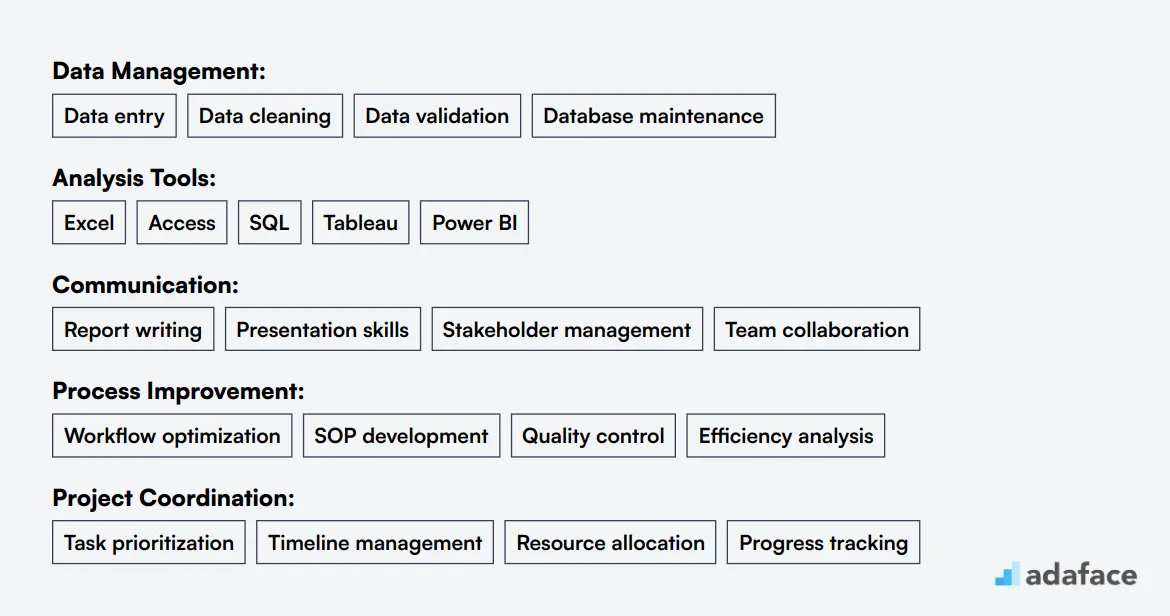
When manually screening resumes, focus on key skills like data management, analytical thinking, and organizational abilities. Look for experience with tools such as Excel, Access, and SQL, as well as data visualization software like Tableau or Power BI.
To streamline the process, consider using AI-powered tools or language models. These can help you quickly sort through large volumes of resumes by matching keywords and generating summaries of each candidate's qualifications.
Here's a sample prompt for AI-assisted resume screening:
TASK: Screen resumes for Data Coordinator role
OUTPUT:
- Candidate name and email
- Matching keywords
- Score (out of 10)
- Recommendation
- Shortlist (Yes/No/Maybe)
KEYWORDS:
- Data management (Excel, Access, SQL)
- Analytical skills
- Organizational abilities
- Communication skills
- [Project coordination](https://www.adaface.com/job-descriptions/data-coordinator-job-description/)
- Data visualization (Tableau, Power BI)
Recommended skills tests for assessing Data Coordinators
Skills tests are an effective way to evaluate Data Coordinator candidates beyond their resumes. These assessments help you gauge practical abilities and ensure candidates can handle the role's demands. Here are five key tests we recommend:
Data Entry Test: This data entry test evaluates a candidate's ability to input information accurately and quickly. It's important for Data Coordinators who often handle large volumes of data input tasks.
Data Interpretation Test: A data interpretation assessment measures how well candidates can analyze and draw insights from various data formats. This skill is critical for Data Coordinators who need to make sense of complex information.
Excel Skills Test: Many Data Coordinator roles require proficiency in Excel. An Excel skills test can verify a candidate's ability to use formulas, create pivot tables, and perform data analysis tasks.
Attention to Detail Test: Data Coordinators must be meticulous in their work. A cognitive ability test focusing on attention to detail can help identify candidates who can spot errors and maintain data accuracy.
Data Wrangling Test: For more advanced roles, a data wrangling assessment can evaluate a candidate's ability to clean, structure, and prepare data for analysis. This skill is valuable for Data Coordinators working with complex datasets.
Structuring the Interview Stage for Data Coordinator Candidates
After candidates pass the initial skills tests, it's crucial to conduct technical interviews to assess their hard skills in-depth. While skills tests are great for initial screening, technical interviews help identify the best-fit candidates for the Data Coordinator role. Let's look at some sample interview questions to help you evaluate candidates effectively.
Consider asking these questions during the interview: 1) Can you explain your process for ensuring data quality and accuracy? 2) How do you handle conflicting data from multiple sources? 3) Describe a time when you improved a data management process. 4) What tools do you use for data visualization, and why? 5) How do you prioritize tasks when managing multiple data projects? These questions will help you gauge the candidate's practical experience, problem-solving skills, and technical knowledge relevant to the Data Coordinator position.
Understanding the Cost of Hiring a Data Coordinator
Hiring a Data Coordinator can be a significant investment for any organization. In the United States, the average salary is about $59,728 per year, with a range typically falling between $36,402 and $87,241, depending on location and experience. Factors such as industry demands and specific job responsibilities can also influence overall compensation.
Data Coordinator Salary in the United States
The average salary for a Data Coordinator in the United States is approximately $59,728 per year. Salaries can vary significantly based on location, with figures ranging from $36,402 at the low end to as high as $87,241. Major cities like Los Angeles and New York typically offer higher salaries, with averages around $72,797 and $59,873 respectively.
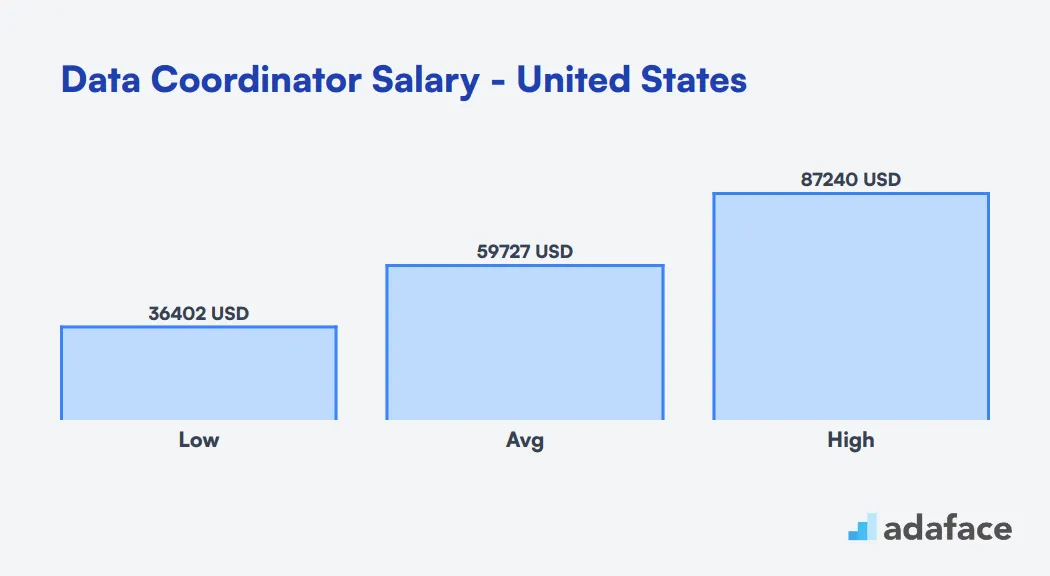
Data Coordinator Salary in the United Kingdom
The average salary for Data Coordinators in the United Kingdom ranges from £20,000 to £35,000 per year. Entry-level positions typically start around £18,000, while experienced professionals can earn up to £40,000 or more, depending on their skills and the company.
Factors affecting salary include location, industry, and experience level. Data Coordinators in London and other major cities often command higher salaries due to the increased cost of living and competitive job market.
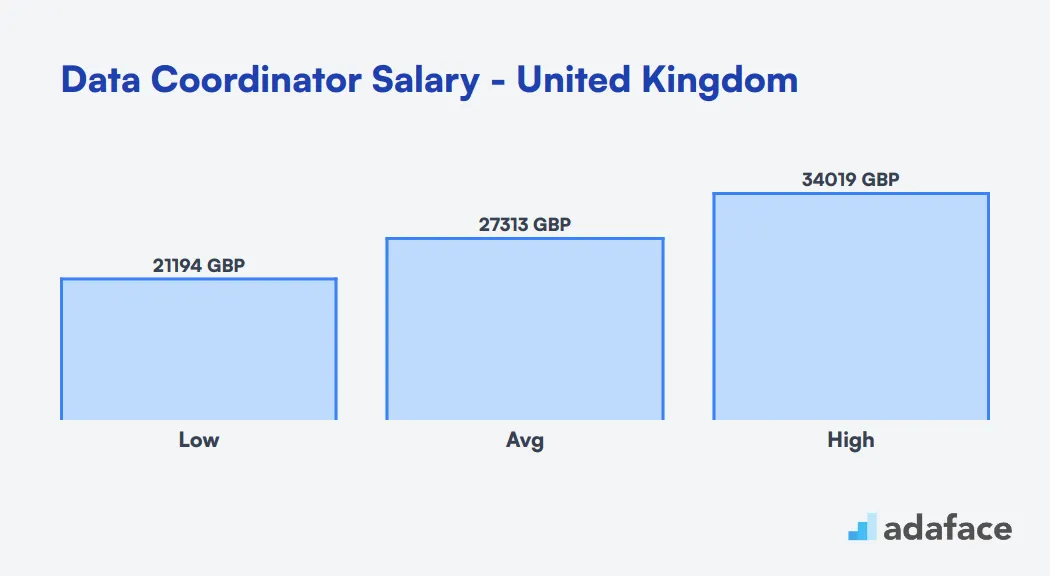
Data Coordinator Salary Australia
In Australia, the average salary for a Data Coordinator typically ranges from AUD 69,513 to AUD 123,157 annually. The median salary sits at around AUD 92,526. Depending on the location, you might find higher salaries in cities like Darwin and Sydney compared to places like Melbourne and Perth.
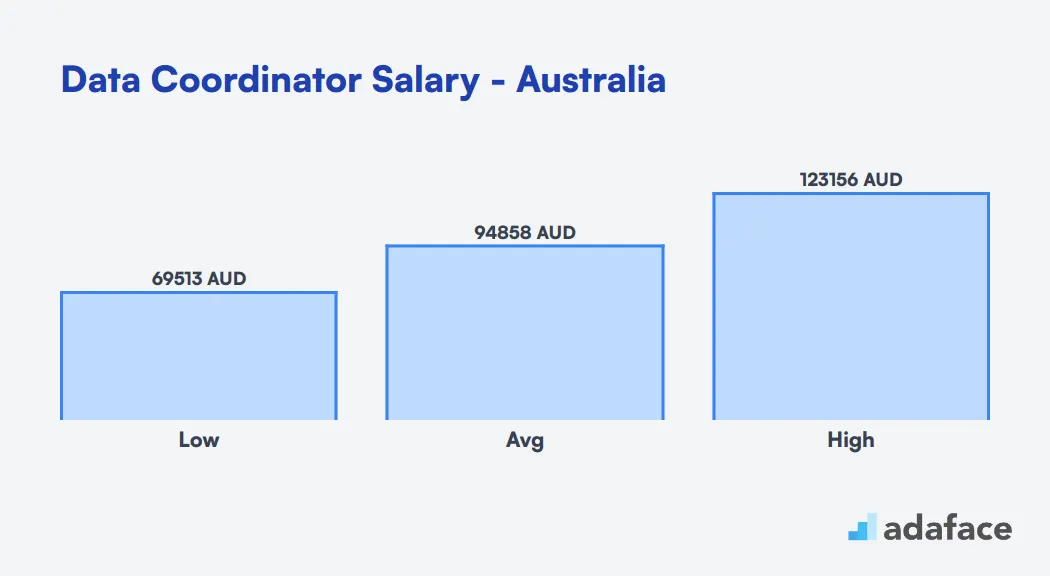
What's the difference between a Data Coordinator and a Data Analyst?
People often confuse Data Coordinators and Data Analysts because both roles involve working with data, albeit in different capacities. However, they play distinct roles within an organization, focusing on varied tasks and requiring different skill sets.
A Data Coordinator is primarily responsible for handling data entry, management, and organization. They ensure the integrity and accessibility of data within their systems. The role often requires a college degree in any field, and they typically work with basic tools like spreadsheet software and database management systems.
On the other hand, a Data Analyst dives into the numbers to extract meaningful insights. They employ advanced analysis using tools like SQL and business intelligence software. Usually, they have a degree in a quantitative field and are skilled in data visualization. Their focus is on interpreting data and presenting it to stakeholders to support decision-making, often taking complex data-driven business questions and breaking them down into understandable insights.
Understanding the roles well can help in effectively identifying these skills using various skills assessment tools tailored for each position.
| Data Coordinator | Data Analyst | |
|---|---|---|
| College Degree | Any field, often Bachelor's | Quantitative field, often Bachelor's |
| Responsibilities | Data entry, management, organization | Data analysis, interpretation, reporting |
| Technical Skills | Database management, basic Excel | Advanced Excel, SQL, data visualization |
| Tools Used | Spreadsheet software, database tools | BI tools, statistical software |
| Focus Area | Data organization, integrity | Data insights, decision support |
| Experience Level | Entry-level to intermediate | Intermediate to advanced |
| Communication | Internal team coordination | Stakeholder presentations |
| Problem Solving | Data quality issues | Data-driven business questions |
Hire the Right Data Coordinators for Your Team
In this blog post, we've covered everything from understanding the role of a Data Coordinator to crafting the perfect job description and conducting effective interviews. We've also looked into the nuances that differentiate a Data Coordinator from a Data Analyst and explored various platforms to find the right talent. By now, you should have a clear idea of what makes an ideal candidate profile and the steps involved in the hiring process.
The one key takeaway is to focus on using accurate job descriptions and role-specific skills tests to ensure your hiring process is as precise as possible. Implementing tests like the data interpretation test can help you assess candidates effectively, ensuring they possess the necessary skills to excel in the role. Remember, a well-defined process not only attracts the right talent but also streamlines your recruitment efforts.
Data Entry Online Test
FAQs
A Data Coordinator is responsible for managing, organizing, and maintaining data systems. They ensure data accuracy, develop processes for data entry and retrieval, and work closely with other departments to support data needs.
Key skills for a Data Coordinator include attention to detail, organizational skills, proficiency with data management software, and knowledge of data analysis and reporting.
During the interview, focus on assessing the candidate's experience with data organization, software proficiency, problem-solving abilities, and their understanding of data integrity and privacy regulations.
A Data Coordinator focuses on organizing and maintaining data, ensuring its accuracy and accessibility. A Data Analyst, on the other hand, interprets data, analyzes results, and provides insights for decision-making.
You can find Data Coordinators on platforms like LinkedIn, Indeed, Glassdoor, and specialized job boards for data professionals. Consider using an online assessment platform like Adaface to screen candidates efficiently.
Technical skills are important for a Data Coordinator, particularly proficiency in data management software and the ability to understand and implement data-related processes.
You can use skills tests to assess a candidate's proficiency in data management, analysis, and organization. Platforms like Adaface offer tailored assessments to evaluate these skills.

40 min skill tests.
No trick questions.
Accurate shortlisting.
We make it easy for you to find the best candidates in your pipeline with a 40 min skills test.
Try for freeRelated posts
Free resources



